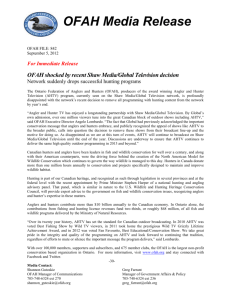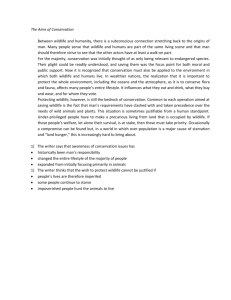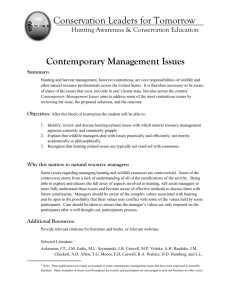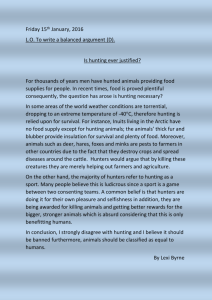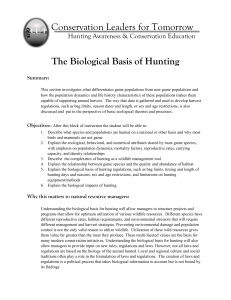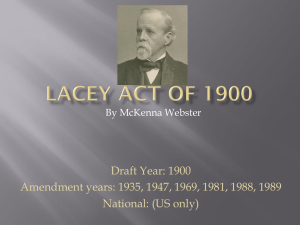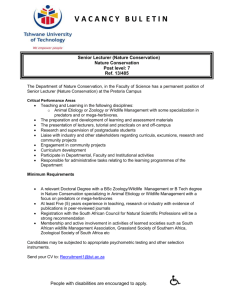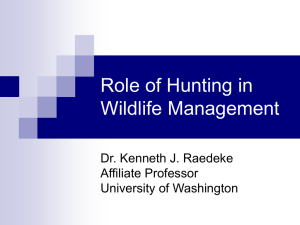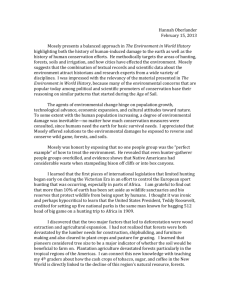Draft AWCP letter to major airlines on shipment of legally harvested
advertisement
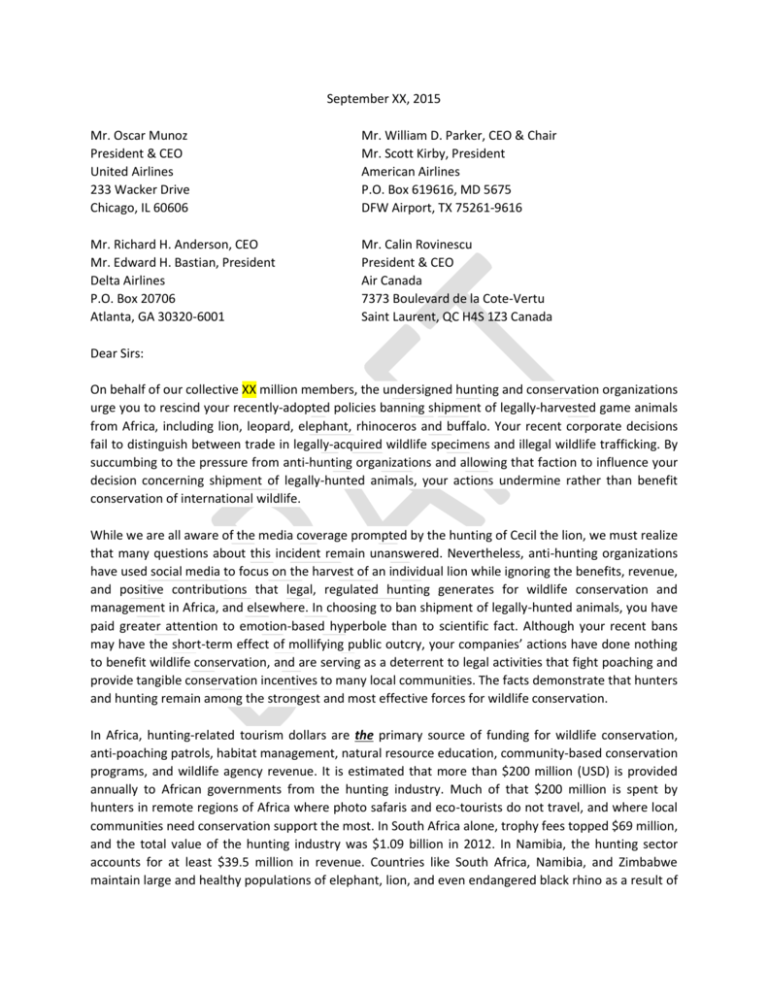
September XX, 2015 Mr. Oscar Munoz President & CEO United Airlines 233 Wacker Drive Chicago, IL 60606 Mr. William D. Parker, CEO & Chair Mr. Scott Kirby, President American Airlines P.O. Box 619616, MD 5675 DFW Airport, TX 75261-9616 Mr. Richard H. Anderson, CEO Mr. Edward H. Bastian, President Delta Airlines P.O. Box 20706 Atlanta, GA 30320-6001 Mr. Calin Rovinescu President & CEO Air Canada 7373 Boulevard de la Cote-Vertu Saint Laurent, QC H4S 1Z3 Canada Dear Sirs: On behalf of our collective XX million members, the undersigned hunting and conservation organizations urge you to rescind your recently-adopted policies banning shipment of legally-harvested game animals from Africa, including lion, leopard, elephant, rhinoceros and buffalo. Your recent corporate decisions fail to distinguish between trade in legally-acquired wildlife specimens and illegal wildlife trafficking. By succumbing to the pressure from anti-hunting organizations and allowing that faction to influence your decision concerning shipment of legally-hunted animals, your actions undermine rather than benefit conservation of international wildlife. While we are all aware of the media coverage prompted by the hunting of Cecil the lion, we must realize that many questions about this incident remain unanswered. Nevertheless, anti-hunting organizations have used social media to focus on the harvest of an individual lion while ignoring the benefits, revenue, and positive contributions that legal, regulated hunting generates for wildlife conservation and management in Africa, and elsewhere. In choosing to ban shipment of legally-hunted animals, you have paid greater attention to emotion-based hyperbole than to scientific fact. Although your recent bans may have the short-term effect of mollifying public outcry, your companies’ actions have done nothing to benefit wildlife conservation, and are serving as a deterrent to legal activities that fight poaching and provide tangible conservation incentives to many local communities. The facts demonstrate that hunters and hunting remain among the strongest and most effective forces for wildlife conservation. In Africa, hunting-related tourism dollars are the primary source of funding for wildlife conservation, anti-poaching patrols, habitat management, natural resource education, community-based conservation programs, and wildlife agency revenue. It is estimated that more than $200 million (USD) is provided annually to African governments from the hunting industry. Much of that $200 million is spent by hunters in remote regions of Africa where photo safaris and eco-tourists do not travel, and where local communities need conservation support the most. In South Africa alone, trophy fees topped $69 million, and the total value of the hunting industry was $1.09 billion in 2012. In Namibia, the hunting sector accounts for at least $39.5 million in revenue. Countries like South Africa, Namibia, and Zimbabwe maintain large and healthy populations of elephant, lion, and even endangered black rhino as a result of the support of tourist hunting. For this reason, the environmental ministers of these countries have spoken out against your unilateral bans. We recognize that without revenue provided by foreign hunters, wildlife conservation and management in Africa will dwindle, as will the very animals that so many speak about supporting. While eco-tourism and photo safaris are legitimate, contributing industries, these activities will not conserve the world’s wildlife. The facts clearly illustrate the importance of hunting-related revenue to the governments, animals, conservation programs, and local communities in many African nations. The hunting industry generates jobs and supports community development. The value that international hunting brings to local communities counterbalances the harm and damage that wildlife like elephants and lions cause to the lives and livelihoods of local residents. Without hunting, wildlife often become nuisance animals that local residents lethally remove to protect their crops and to safeguard their families. Hunting gives these animals significant value and persuades local communities to conserve these species, rather than killing them for food or to address crop damage. Your collective corporate actions are undermining this entire conservation system. By refusing to ship legally-hunted animals, you are discouraging hunters from traveling to these countries. In great part due to your shipment embargos, the world’s wildlife will be deprived of much-needed conservation funding and support. We strongly recommend that you leave decisions about wildlife conservation and trade to those with expertise in this field. International agreements between governments, such as the Convention on International Trade in Endangered Species (CITES), already exist. These treaties oversee and regulate harvest, trade, and subsequent transport of legally-harvested specimens. CITES, through the decisionmaking of the scientific and management authorities of 181 countries, makes well-reasoned determinations on the impact of wildlife trade. CITES recognizes that regulated hunting is a form of sustainable use that creates many conservation benefits for species, and incentivizes people to conserve those species. The U.S. government, a party to the CITES treaty, has adopted our own federal statutes and regulations designed to regulate trade and to conserve both domestic and foreign species. These treaties and laws, developed and adopted by international and domestic leaders, acknowledge the benefits of international hunting and authorize importation of the sport-hunted animals that your companies now refuse to transport. Further, your transport bans threaten the livelihoods of communities who co-exist with native wildlife. The greatest threat to wildlife like elephant and lion is not regulated hunting; it is the frustration of poor rural residents who need to live and eat. Unless wildlife is given an economic value, it is at risk of habitat encroachment and retaliatory killing. Hunting provides this value. In Namibia, 100% of hunting income on communal land goes back to the community. In Tanzania, the community’s share of hunting income was just increased to 75%. In Zimbabwe, at least 55% of fees generated on communal land is directdeposited into village accounts. Safari operators throughout Africa provide meat, money, supplies, transport, and other benefits to the villages by their concessions. Wildlife can be a source of pride and poverty reduction for communities – as long as the hunting continues. We ask that you rescind your policies against shipment of legally-hunted animals. In making this request, we clearly state that our organizations do not condone or excuse the illegal take of wildlife. Like all ethical and legitimate hunters, we find poachers and the act of poaching itself abhorrent. The penalty for those who intentionally violate hunting laws and regulations cannot be minimized. However, the deeds of a few bad actors should not be used as an avenue to undermine legal and sustainable hunting practices. The solution to poaching is not to penalize the hunting community or to erase all the beneficial impacts of hunting. Instead, we must all look for effective ways to combat the actions of those who violate existing laws concerning the take and transportation of wildlife. Collectively, our hunter-conservationist members routinely fly your airlines, generating millions of dollars in revenue for your companies. We have an untold number of “frequent flyers” who annually do significant business with your airlines. Hunters frequently fly more than other demographic groups, for business and recreation; no doubt, we are many of your best customers, but we will be forced to consider alternative transportation options if your companies persist with policies that discriminate against hunters and undermine sustainable-use conservation. We urge you in the strongest possible terms to reverse your decisions and in doing so, help conserve wildlife for future generations. We appreciate your consideration, and we look forward to receiving your written responses to our request. Conservation Force Dallas Safari Club Houston Safari Club Safari Club International Wild Sheep Foundation
